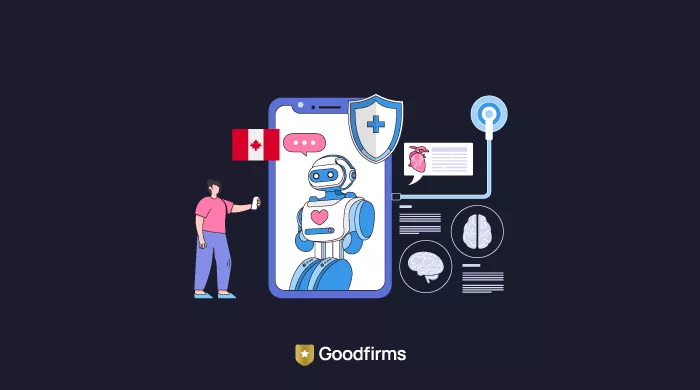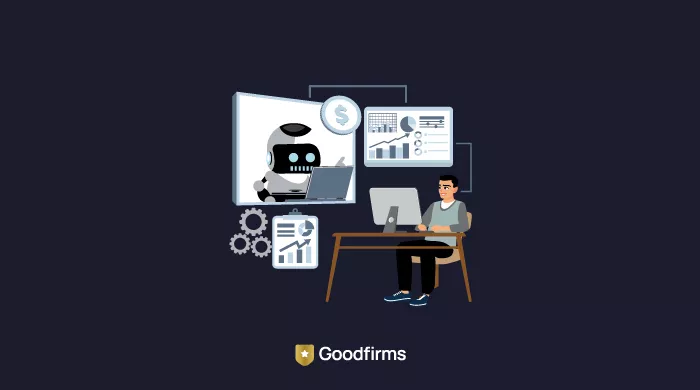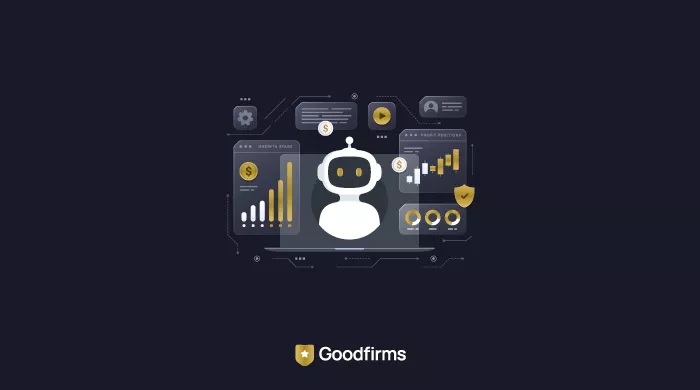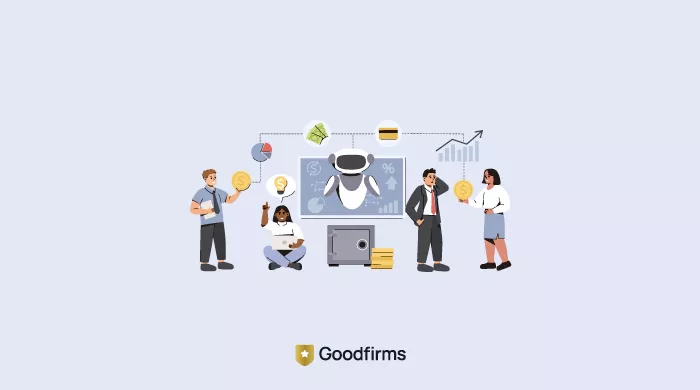Do you ever look up at the stars and wonder what the future holds for you?
Today we live in a world of interconnected realities enhanced by Artificial Intelligence (AI). Right from the moment that you wake up and open your phone with your fingerprints or face detection to the moment you go back to sleep after strolling through your social media feed
AI is everywhere, changing the way the world functions. AI companies are transforming the lives of millions of people sector by sector, so why would the field of Astrology be spared from this disruptive technology?
During difficult times, even the most non-believing people turn to astrology to seek hope for their future, and during this generation, the covid-19 pandemic has been one of the most difficult and dark times that humans all around the world have faced as a community.
Entrepreneurs in deeply spiritual countries like India recognized the ocean of opportunities that the field of astrology presented and decided to give it a tech facelift. AI algorithms like machine learning, big data, and neural networks are excellently known for their abilities to process large amounts of data and offer advanced pattern generation, sorting, and prediction opportunities. Merging the two, AI and Astrology, tech is successfully turning it into a billion dollar industry globally.
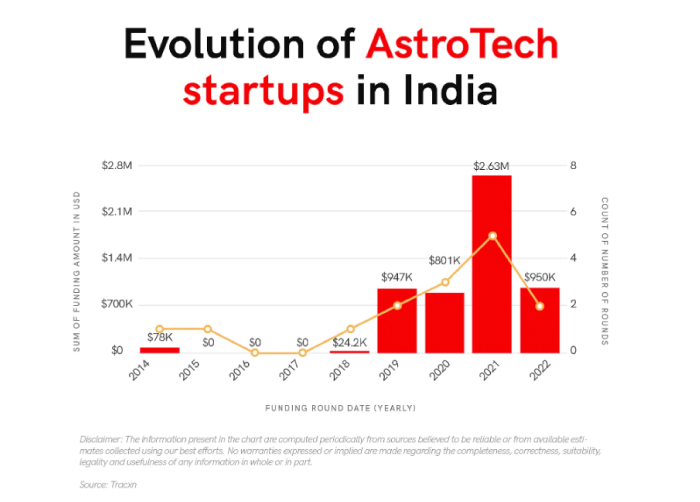
The Pandemic Market: User Engagement In Astro Apps
You must be wondering about the sudden boost of astro apps in the market, seems like a trend that came out of nowhere as suddenly every third person has some sort of astro app installed in their smartphone.
Astrology has always been a form of heavily consumed content amidst the East Asian countries especially India and China wherein it has played a significant role throughout history. The Indian religious and spiritual market is estimated to be worth approximately $40 billion in 2020, so even before the tech revolution of mobile app development companies bringing astrology to people’s fingertips, the public used to travel far and deep to renowned astrologers for reliable predictions and good fortune.
With the pandemic putting the world in a lockdown situation and with heavy uncertainty looming over our heads, the world witnessed the growth of on-demand apps and everything, every service or role went online. Accessibility became the bridge that drew millennials and Gen Z to get closer and explore different forms of astrology via apps and the internet. “It has also allowed millennials to explore the category with repeatable use," says Sanil Sachar, Founding Partner, Huddle.
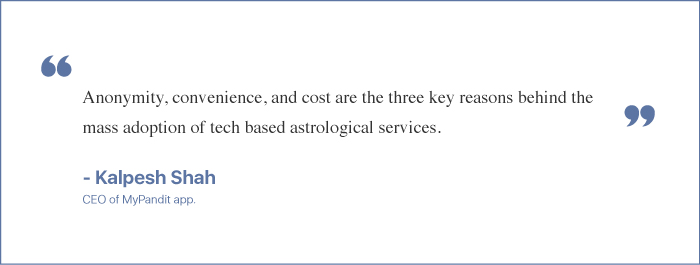
How AI Enhances Astro Apps: Key Features
AI is widely used in different industries for its fast computing, data processing, and cybersecurity. These features are essential for the success of any app regardless of the domain it is meant to serve. Even the best real estate app development companies or healthcare app development companies would have to rely on AI for data collection and app security.
Here are some ways in which AI enhances astro apps to deliver a better and safer service to the users:
1. Data Security- Astro apps require personal information of the users such as their name, date of birth, place of birth, time of birth, etc to generate birth charts and create a predictive pattern based on their chart’s astrological alignments with stars and planetary positions. Sometimes users opt for compatibility readings from astro apps which require personal information of their partners as well. Such intimate and detailed information of the users is at risk of data breach if the app is not properly secured. With AI enhanced apps tech companies can easily secure the user data and avoid potential data thefts.
2. Predictive Analytics- One of the main features of AI and ML is the power of accurate predictive analytics. This feature of AI truly empowers many AI based astrology apps as it helps users gain accurate predictions based on the positions of stars and planets in that particular day, month, or year. The Co-Star app uses data from NASA to predict and write horoscopes. The algorithm of the app predicts a personalised horoscope based on the position of the planets on that day amidst other variables. The real time insight only helps to further the appeal of accuracy that this app markets to its users. AI can help astro get so much further in its insights.
3. Personalized Readings and Horoscopes- Apart from good fortune, people also turn to astrology to know about future hurdles and misfortune and come up with divine solutions for them. There are plenty of astro apps that not only provide personalized readings but allow the users to talk/ chat with real psychics and astrologers at a given fee. The advice given is based on data generated by the AI algorithm and birth charts of the individual. AI enhanced apps use push notifications to intrigue users into developing a habit of daily checking and engaging with the app with new insights.
4. Personality Assessments- Much like the currently trending MBTI personality assessment, users often turn to astro apps for personalized personality assessment based on their horoscope and other astrological factors. The tests are generated based on the preferences of the individual user and the assessment, likewise, is a report generated by AI with the help of the input given by the user, as well as variable factors such as horoscope traits, natal chart characteristics, etc.
Still, you might wonder what is the charm of these AI enhanced astro apps that have people so invested, Banu Guler, the CEO and co-founder of Co-Star explained that the reason why Co-star’s astrology has gained popularity is because it gives users the feeling that a human is talking about their reality; but as a form of self-care and in building relationships.

Investment Scope In Astro Apps: The Monetization Strategy
Nothing in the world is free. Although everyone likes freebies. In fact, people usually get suspicious about the quality of the information or product if it is provided completely free in this dog-eat-dog world. The same is the case with astrological advice and readings. People have been conditioned to believe that expensive things are representative of good quality, hence free stuff is appreciated but not to be trusted.
With the boom of on-demand apps throughout and post pandemic, astro apps have built a profitable monetization strategy that helps keep a good balance between price-effectiveness and trust-worthiness.
The most common marketing tactic for astrology apps is to advertise free consultation for new users and thereafter charge a particular fee for every different service that the user wants to avail. Therefore as an entrepreneur you can easily hire the best mobile app developers in the market to create an astrology app as your business venture.
Many apps lure in the users with promises of free readings, live consultations, etc and once the users give in to the temptation of signing up and availing the services, they inevitably spiral into the practice of using the predictive services of the app which are by then chargeable, although at a low price.
Most astro apps are not fully paid apps, but have a few features that are free for daily use of the users such as daily predictions which are auto-generated based on your horoscopic information. Features that usually pull in the most money in apps are as follows:
- Live Readings Of Fortune
- Chat or Call with Astrologers or Psychics for limited time
- Specific Paid Questions and Consultation
- Generating Paid Birth Charts
- Paid Compatibility Tests
- Spiritual Guidance- Paid fortune readings for specific time period
- Selling Gemstones and other divination artefacts
There is an array of different astrological services and apps that are available in the market for users to try and test. Here are some of the most popular fields of astrology that people look out for:

Natal Astrology: Includes birth charts and life predictions based on planetary positions and other luminaries.
Modern Astrology: Includes personality assessments based on the work of Carl Jung that incorporates psychoanalysis with astrology.
Vedic Astrology: Based on the Hindu religion and philosophy, rooted in the ancient scriptures of Vedas.
Horoscopic Astrology/ Western Astrology: Based on your birthday and month, offers daily, monthly, yearly insights, and is most popular and renowned.
Chinese Astrology: It is based on traditional Chinese astronomy, calendars, and philosophy of nature and composition of human energy.
Apart from these, there are other popular practices of the mystical art of astrology as well such as palmistry, numerology, tarot reading, and physiognomy. Tech entrepreneurs monetize the different features available in their apps based on the type of astrology app they have created, so you can reach out to the best android app developers or iOS app developers in the market to discuss the features you would like in your app if you want to jump into tech-astro market. Since these services are often not very expensive to keep the users coming back, people often give in to the temptation of their curiosities. Afterall, what are a few pennies compared to the hope of a good day ahead?
Case Study: Co-Star, the App that is Successfully Blending Science into Astrology through AI
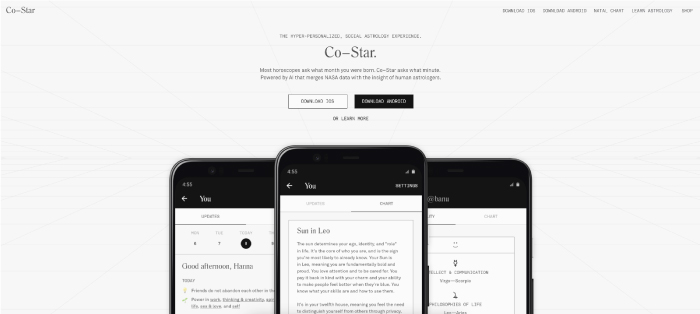
Co-star is one of the most popular astrology apps on Google’s Play Store and Apple's App Store with a whooping 4.8 rating and over millions of downloads thus far. What sets the app apart from its competitors and makes it relevant for this blog is the way it uses AI to simulate the most accurate horoscopes for its users.
Co-star uses personal biographic information of the user, like their name, date of birth, and time of birth to create natal charts which are indicative of one’s character traits, behavioural tendencies, and determine the direction of one’s life by using NASA data. The app’s AI algorithm uses the exact location of the planets and other luminaries to calculate the user’s star alignments and give out eerily accurate horoscope predictions.
The CEO of Co-Star, Banu Guler, mentions in her interview with Vogue that it is not the question of whether astrology is real or not that intrigues people, because that will always be up for debate. She says,“I think that, to me, is the magic [of astrology], not, can we predict if we’re going to fall in love forever? Who gives a shit? We’re all going to die. [It’s about,] Can we connect in a deeper way than we could without it?”
The homepage of the app’s website cites that the idea behind creating this app also comes from the fact that for years astrology was restricted to those with access to personal astrologers, but now it is accessible to all. They have a team of AI data scientists coupled with the methods that professional astrologers use, they generate algorithms which are then translated by writers into predictions for users in the form of push notifications or daily alerts.
By incorporating AI algorithms to mimic the methods of professional astrologers, backed with proprietary planetary data from NASA, the predictions offered by Co-Star are hyper-personalized and reviews from users on the website suggest hardly ever vague or off.

(Source: Co-star homepage)
“Astrology puts our temporary bodies in context with our universe's vastness, allowing irrationality to invade our techno-rationalist ways of living.” - Co-Star
Science or Superstition?
Psychologist Graham Tyson conducted a study in 1982, which revealed that the people who usually seek out consultations with astrologers did so due to certain factors/stressors in their lives. He went on to add that stress concerning an individual’s personal and social relationships is one of the main reasons. He further explained that, “Under high-stress conditions, the individual is prepared to use astrology as a coping device even under low-stress conditions he does not believe in.”
Astrology is a Pseudoscience. It weaves a story of one’s past, present and future in the most inviting manner possible to keep the interest alive while simultaneously giving people hope of a better future. Although there is no solid evidence backing the predictions made by reading the stars in the sky, except word of mouth, it is a practice that has been alive and around across cultures and civilizations throughout the history of mankind and just from this fact, it has to have some essence that makes it so relevant in our lives.
The universe is vast and our human race quite a youngling that is yet to discover many major phenomenons. Recently NASA debunked the myth of a soundless universe by releasing the sound emitted by a blackhole. Netizens took to social media, following the viral clip, coming to the conclusion that the vibrations emitted sound vaguely similar to OM, which the hindu sages had always named as the sound of the universe in the ancient texts.
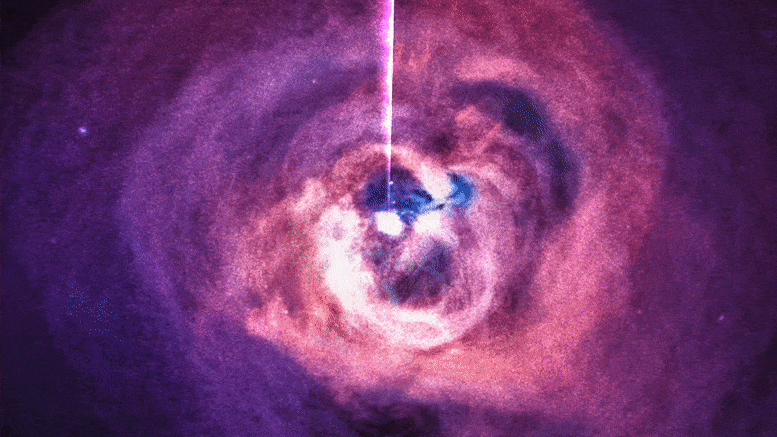
(Sound of the universe GIF)
Taking this into consideration, there is much that we don’t know about the universe and the mysteries surrounding it. Keeping an open mind to the subject of astrology is a healthy approach that can benefit many people. Science and Astrology can work together to produce more accurate predictions for the masses through AI predictive analytics and algorithms as mentioned above.
Therefore, rather than pitching the two against each other, wouldn’t it make more sense to use them in a complementary way to guide humanity further in its endeavour to discover the mystery that is out there.





